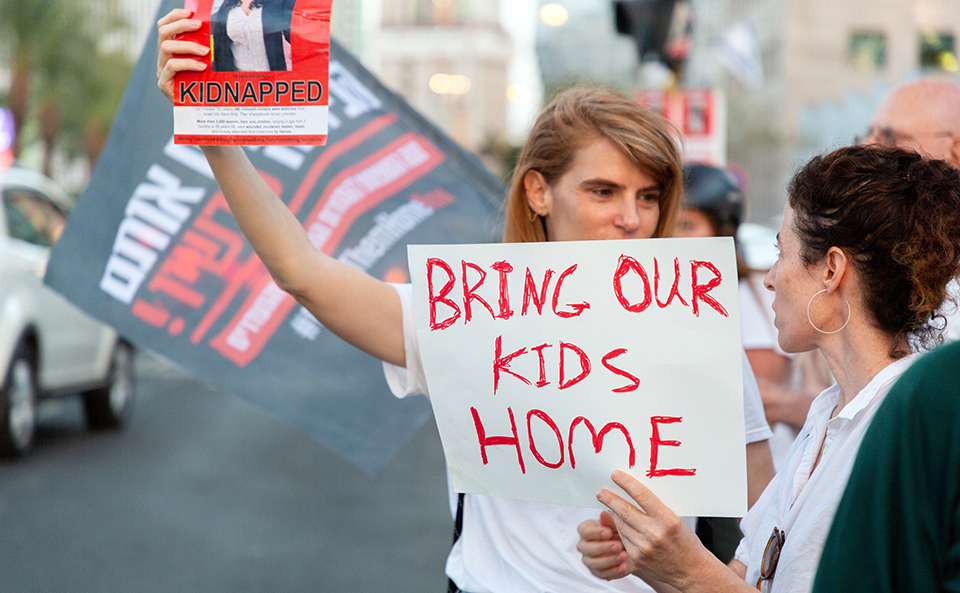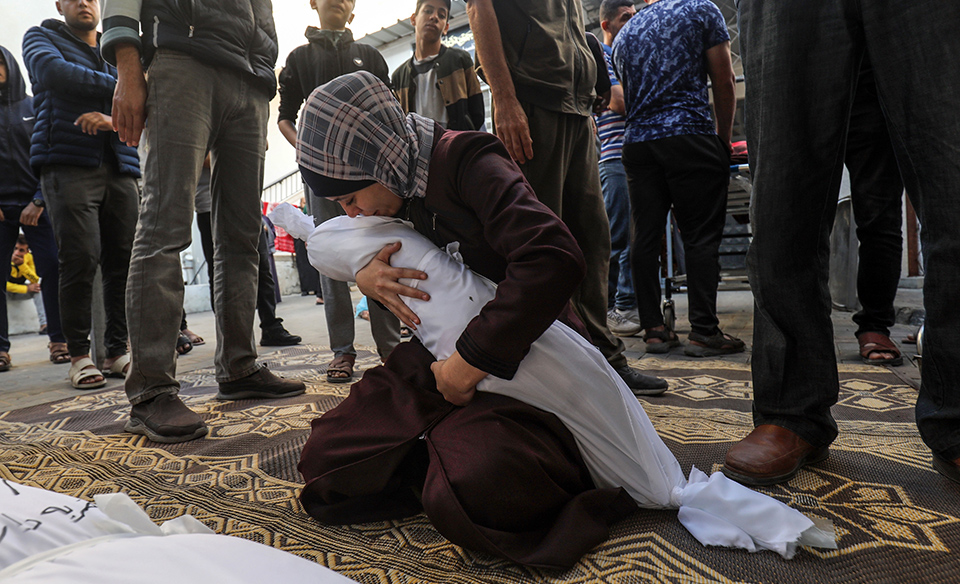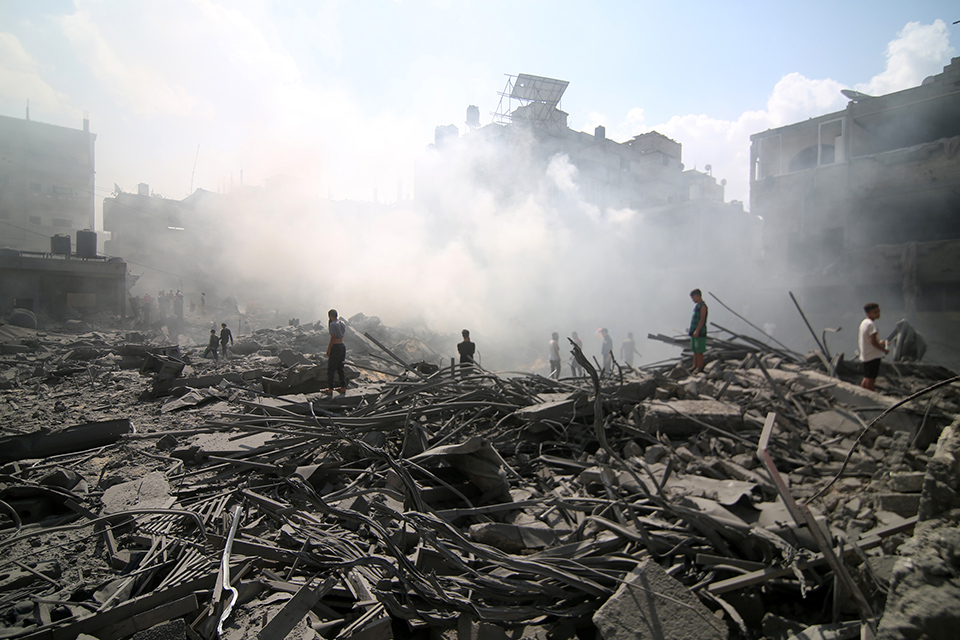Dead bodies are piling up in Gaza as I write: civilians blown to pieces, homes flattened, bloodied children with their limbs swinging loose like broken puppets in the arms of frantic rescuers who desperately seek to pull other members of their family from the rubble and the ruin.
Everywhere is death and destruction and cruelty and chaos, and by the end of this day the toll will have climbed higher again. Hell is raining down on the people of Gaza: the collective punishment that knows no mercy.
As observed by aid agencies and humanitarian organisations, nowhere is safe and no-one is safe.
Wael Al-Dahdouh, the journalist and Gaza Bureau Chief with the Al Jazeera network, moved his family to what they believed was a safer area in the enclave last week – the Nuseirat refugee camp.
His efforts came to naught. His wife, son, daughter and grandson were all killed in an Israeli airstrike. The anguish on his face is devastating.
https://twitter.com/amanpour/status/1717602477212594337
He is seen crouching beside his 15-year-old son, Mahmoud – and seen elsewhere cradling the lifeless body of his grandson. He laid his family to rest, like so many other families were forced to do, while missiles continued to pound Gaza.
Mass graves and crouched burials are now the norm: even the comfort and ritual of burial is denied to a traumatised people. One man, Ibrahim al-Lahham, told the Financial Times that 17 members of his family were killed by an Israeli strike on their homes in Gaza.
17 members of one family wiped out. It is incomprehensible, unimaginable. Some parents are writing names on their children’s arms so that they can be identified if a bomb takes the rest of their family. CNN reported that one Palestinian-American family had lost 42 members in just one day in Gaza. 3 of those killed were eye-doctors. None has any links to Hamas, their families insisted.
Meanwhile, the EU frets over whether to use the word ‘pause’ or ‘ceasefire’ in a bid to allow humanitarian aid into a besieged people. And, in search of the “mighty vengeance” sworn by Benjamin Netanyhu, Israel continues to bomb refugee camps, UN schools, and church halls, and threatens hospitals.
The media photographs from the tiny strip which is home to 2 million already-impoverished people offer heart-breaking evidence of the appalling, indefensible, relentless slaughter.
There is no other word for it. Most of those justifying the thousands of dead civilians in Gaza must know in their hearts that the past weeks have seen relentless and repeated breaches of the international laws which were designed to protect civilians and to hold countries at war to some standard of humanity.
OCTOBER 7th
After the vicious cruelty of the Hamas incursion into Israel, most of the world shared the anger and understood the anguish of the Israeli people at what had happened. The sickening, murderous attacks of October 7th that murdered almost 1,400 people and left Israel reeling, were rightly strongly condemned.

_ _ _ _ _ _ _ _ _ _ _
Israel’s rage is understandable. The desire for revenge is understandable too, on a human level. And they have families held hostage by Hamas after the deadly raids.
But the reality is that decades of an eye-for-an-eye and satisfying the urge for vengeance has left both Israelis and Palestinians marked for generations with the scars of bitter conflict.
The Israeli government published photos of babies killed by Hamas. The bodies were charred and blackened, yet it was evident that they clung to each other at the end. The images were absolutely harrowing. How can anyone look at a child and pull a trigger, or wield a knife, or burn a home to the ground.
Now, it seems that Israel is bent on matching that horror with their own.
It doesn’t seem to matter that 70% of the Palestinian who have been killed are, the UN says, women and children. It doesn’t seem to matter that 3,500 children are reportedly amongst those killed. Instead, we get snide sniping disputing the numbers of the dead, even though some observers say that many more, including missing children, may remain uncounted among the rubble.
Some people who are trapped and injured in the rubble likely die before they are rescued, because it is so difficult for families to search with bare hands in the chaos and broken stone when bombs are still falling around them. That would be an terrible death.
And for every bombing of a church hall or a UN school or a field hospital the same justification is offered: the insistence that these were Hamas control centres or that Hamas leaders were the target. When a UN school providing shelter is bombed, Israel says Hamas was the target. It seems more and more like a convenient cover or a callous disregard for the innocents that will be blown to pieces.

_ _ _ _ _ _ _ _ _ _ _ _ _ _ _
64 UN aid workers in Gaza, working to help desperate people, were killed by bombs and missiles and Israeli military action in just over three weeks. Were they part of a Hamas command centre too?
The church hall at St Porphyrios Church, the oldest active Catholic church in Gaza, was pulverised by an Israeli air attack, killing at least 18 Christians, including 10 from one family.
Hundreds had come to the shelter next to the church. They fled desolation but desolation followed them, the distraught survivors cried out. The Israeli military bombed them where they had sought sanctuary.
Greek Orthodox Church of St. Porphyrios in Gaza Bombed
“The Orthodox Patriarchate of Jerusalem expresses its strongest condemnation of the Israeli airstrike that have struck its church compound in the city of Gaza. The Patriarchate emphasizes that targeting churches and their… pic.twitter.com/OQfYpmNXjY— Mats Nilsson (@mazzenilsson) October 20, 2023
BBC examined instances where the Israeli Defence Forces sent messages to Palestinians living in neighbourhoods of Gaza telling them to leave ahead of an airstrike from Israel and to go to a designated safe area. In one instance, in an October 8th message, that area thus designated as safe by the IDF was Khan Younis city centre. Two days later Khan Younis city centre was bombed by Israel.
Now Israel is demanding hospitals to evacuate, even though doctors say it is impossible for patients who are too ill to move, for babies in incubators, and for those in intensive care. Many have also said they will stay with their patients even to the end.
Doctors in Gaza have been forced in recent weeks to operate on patients, including children, without anesthetic because of the Israeli blockade. One told ABC news that “the only thing worse than the screams of a patient undergoing surgery without enough anesthesia are the terror-stricken faces of those awaiting their turn”.
We are told that dropping leaflets telling people in a hospital to leave is tantamount to a warning which then justifies bombing civilians. Except that’s not true. Everyone involved knows it’s not true. Where can the sick and the post-operative and the wounded go? Even if they could be moved, would it be to a camp where they will be bombed in turn?
On Tuesday, Jabalia refugee camp in Gaza was bombed, the air strike leaving craters and the by-now familiar shattered buildings, and broken bodies. The Israeli Defence forces said the strike had enabled them to kill a Hamas commander and some of his battalion. The civilian dead are likely just considered collateral damage, to use the phrase of the former U.S. Secretary of State, Madeleine Albright.
Dozens reported killed in explosion in northern Gaza refugee camp https://t.co/hAPiaRRsPw
— BBC News (World) (@BBCWorld) October 31, 2023
The scene is like something from an apocalyptic movie. What can arise from those ashes except further generations of hatred and conflict?
Israel’s supporters accuse Hamas of using civilians as “human shields”. That makes no sense to me. Clearly, Israel takes no notice whatsoever of the ‘human shields’ and just bombs them to bits anyway. Either way, the body count keeps rising.
RECKLESS HATE
So much death. What can we do, as Tolkien said, in the face of so much reckless hate?
Our lives are, of course, largely untouched by the chaos of war. Maybe that is part of the reason our conversations around the horrendous, brutal conflict in the Middle East tend to be so unproductive.
The horrors, terrible and savage as they are, have become commonplace in the decades of intractable friction between Israel and Palestine. Though we may not realise it, we are likely shocked a little less each time, even when the violence is as medieval and barbaric as we have seen in recent weeks.
And so we look away from our screens, and walk the dog, and go for a coffee, and we return our minds to the bothersome price of electricity and to other everyday matters, and sometimes we quietly thank God that we live in peace.
Or we get down to the business of dehumanizing and othering not just the people on each side of this dreadful war but everyone who has a contrary opinion on it. So anyone who deplores the slaughter of Hamas’s incursion is a “shill for Israel” – and anyone who criticises Israel’s bombing of innocent people in Gaza is “anti-Jew”.
Each side seems as intransigent as the other, and it is getting worse. Some of that is understandable, but it’s not helpful. The truth is that it is profoundly dishonest to pretend that the killings and bombings and anguish and pain is only confined to one side, even if that is the side you have taken.
There was an indecent haste from the left to rush out with flags in support of their cause while the bodies of murdered Israelis were not yet cold. Could they not at least have paused to offer condolences – or would that have made them seem ‘pro-Israeli’. How can they think peace is built on that foundation? Do they think they can simply ignore the grief, the suffering caused by the attack?
And then there is also the stony-faced, cold, callous defence and justification of Israel’s hammering on the people of Gaza. No condolences or concern for untold suffering from that side either. No pity for the terrified, screaming children, covered in blood and rubble, clutching their dead parents – or for whole families wiped out, bodies piled up in the hellscape that Gaza has become,
I think many people can and do believe that the state of Israel has a right to exist, and also simultaneously believe that Palestinians were unfairly treated in the establishment of that state. The history of this region is long, complex and violent. Each party claims a particular right to the part of the world once called Palestine.
In the time before Christ, there was undoubtedly a kingdom of Israel, which was subsequently conquered by Assyrians, Babylonians, Persians, Romans, several Muslim dynasties and a bewildering array of others until it was captured by the Ottoman Empire in 1516, who ruled until the period of the First World War, when it was taken from the Ottomans by Britain.
The British government, at the time very much influenced by a movement called Christian Zionism, supported the creation of a Jewish homeland in Palestine – and the British, as they did elsewhere, sought to present a plan to carve up territory without the permission of the people actually living there. Such imperiousness never ends well.
The United Nations then offered its 1947 plan – to divide Palestine into two states; one Arab and one Jewish. That plan was rejected by the Palestinians, because they argued they would lose a disproportionate amount of territory (two thirds of the population of the region were Arabs), but the state of Israel nonetheless declared its independence according to the UN territorial divide in May 1948. Arab nations surrounding Israel then declared war.
Since then, and this is obviously a summary, Israel has seized an increasingly larger share of the territory and Palestinians are now forced to live in two enclaves: Gaza and West Bank.
Israel says the land grab was due to the wars launched against them by Arab nations and allies of Palestine. Critics of its expansion say that even now Israeli settlers continue to take land in the West Bank, and that 700,000 Israelis are living in this illegally seized Palestinian land.
A recent UN report described the “correlation between the expansion of outposts and settler attacks against Palestinians”.
“During the past decade, the United Nations had verified 3,372 violent incidents by settlers, injuring 1,222 Palestinians. Last year, settler violence reached the highest levels ever recorded by the United Nations. Israel had failed to investigate and prosecute crimes against Palestinians committed by settlers and Israeli forces,” it said.
What is certain is that, largely because of Israeli blockades and bombing, the Palestinian people in Gaza live in what Senator Michael McDowell called “a terrible place and an inhuman pressure cooker”.
A 2022 report by Save the Children found that “4 out of 5 children in Gaza were already living with depression, fear and grief.” Distressingly, more than half of the children surveyed said they had contemplated suicide.
McDowell also pointed out that it is contended that the rise of Hamas was initially encouraged by Israel who originally saw the movement as an opportunity to diminish the power of the Palestine Liberation Organisation (PLO) and divide the Palestine Authority who still govern the West Bank and who do not support Hamas.
But now, as the eyes of the world are on Gaza, Israelis are attacking Palestinians in the West Bank, killing villagers including women and children – accompanied in the deadly raids, media reports say, by Israeli soldiers. How can this be excused? How can attacks on the people in the West Bank, ruled by the Palestinian Authority, not Hamas, be explained? These actions do not speak to a people or a government who are committed to peace or justice.
Israel will, in turn, argue that peace is not possible while Hamas is firing rockets into Israel, which has lived for decades protected by the Iron Dome needed to protect its citizens.
But what is the alternative? Endless war? The elimination of an entire people?
AN IMMEDIATE CEASEFIRE IS REQUIRED
Perhaps it seems pointless, after 80 years and so much bloodshed, to try to address the fundamental question: did Israel have the right to expel Palestinians from their own land in order to declare an independent state? But maybe if both sides could approach that question again with honesty and generosity some progress could be made.
Sadly, the hatred and dehumanisation so visible online seems to suggest that neither side wants to reach an understanding in that regard, or wants to move forward to a mutually beneficial solution.
For many on the sidelines, the observation by Yeats regarding “great hatred, little room” never seemed so precise. But in the Middle East, as elsewhere, the most enduring hatred is not just learned: it is born of shocking, searing experience – of seeing your family bombed to pieces or your loved ones shot dead at a music festival.
That is why a ceasefire is immediately and urgently required. There are already more than 8,500 Palestinians and 1,400 Israelis dead. The innocent are suffering the horrors of a war that is not of their making. It goes without saying that Hamas must be part of that ceasefire too and that hostages must be returned home unharmed.
What is certain is that Israel is by far the more powerful of the combatants, armed and supported by the U.S. and backed to the hilt by most Western governments. They have the firepower to pulverise Gaza and they are doing so, while the West makes some half-hearted statements about humanitarian corridors and the rules of war.
This week, a Tory MP, Paul Bristow was sacked from his government post after calling for a ceasefire in Gaza. That seems extraordinary to me. It does not bode well for free speech if an elected representative cannot speak his mind about the atrocities of war, or ask for an end to hostilities that are causing concern for most voters.
Palestinians suspect that it is Israel’s intention to drive them entirely from the narrow Gaza Strip, and a document posted by Wikileaks this week which seemed to show Israeli Ministry of Intelligence suggesting that forcing civilians from Gaza into Egypt would “yield positive and long term strategic results”, will not have done anything to assuage those fears. Israel says the document was a draft and is being misinterpreted.

_ _ _ _ _ _ _ _ _ _ _ _ _ _
But what is to be gained by killing more civilians and terrorising more families? Recent experiences in Iraq and Afghanistan may indicate that all the firepower in the world may not be enough to wipe out an enemy. Reducing Gaza to rubble may only extend and inflame tensions across the regions with horrendous consequences for both peoples.
The words of the ancient Greek historian Thucydides have often been recalled these past weeks: “The strong do what they can, the weak suffer what they must”. But that is not how we are supposed to live in the modern world. Just as we witnessed the terror of the Hamas incursion, the suffering of the people of Gaza is visible to us all. The West can no longer simply look away.